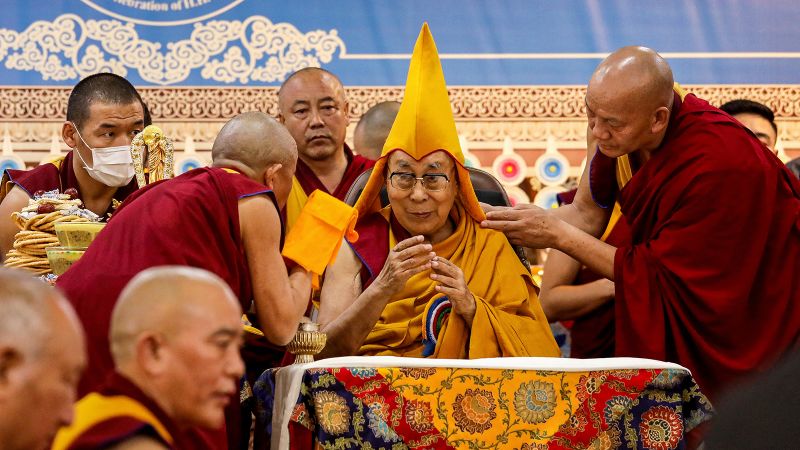The Dalai Lama has announced that he will ensure a successor follows him, perpetuating a centuries-old tradition that has become a point of contention with China’s Communist Party over Tibet’s future. The spiritual leader of Tibetan Buddhism made this declaration on Wednesday in a video message to religious elders gathered in Dharamsala, India. The Nobel Peace laureate has resided there since fleeing a failed Tibetan uprising against Chinese rule in 1959.
“I am affirming that the institution of the Dalai Lama will continue,” said the Dalai Lama in his pre-recorded message, referencing numerous requests from Tibetans and Tibetan Buddhists urging him to maintain the tradition. He emphasized that the Gaden Phodrang Trust holds the exclusive authority to recognize his future reincarnation, dismissing any external interference in this sacred process. “The office should carry out the procedures of search and recognition of the future dalai lama in accordance with past tradition,” he stated.
The Historical Context of the Dalai Lama’s Succession
The Dalai Lama’s announcement comes at a critical juncture, just days before his 90th birthday. Historically, the succession of the Dalai Lama has been a deeply spiritual process, involving high lamas and traditional rituals to identify the reincarnation of the previous Dalai Lama. This process, however, has been complicated by geopolitical tensions, particularly with China’s assertions over Tibet.
Since the Dalai Lama’s flight to India in 1959, Tibet has remained a sensitive issue between China and the international community. The Chinese government claims sovereignty over Tibet and insists on its authority to approve the next Dalai Lama. This stance is in direct opposition to Tibetan Buddhist traditions and the wishes of the Dalai Lama himself.
China’s Stance and the Potential for Dual Leadership
The announcement sets the stage for a potential conflict over the Dalai Lama’s succession. The Chinese Communist Party, which is officially atheist, maintains that it has the right to appoint religious leaders in Tibet. This claim has been met with skepticism and resistance from the global Tibetan community and human rights organizations.
“The Dalai Lama has previously stated that his successor will be born in the ‘free world’ outside China, urging his followers to reject any candidate selected by Beijing.”
This directive could lead to the emergence of two rival Dalai Lamas: one chosen by the traditional Tibetan process and another appointed by the Chinese government. Such a scenario would not only deepen the rift between Tibetans and the Chinese state but could also complicate international relations concerning Tibet.
Expert Opinions and Global Implications
Experts on Tibetan affairs suggest that the Dalai Lama’s decision to ensure a successor outside of Chinese influence is a strategic move to preserve Tibetan culture and autonomy. Dr. Lobsang Sangay, former President of the Tibetan government-in-exile, remarked, “This is a crucial moment for Tibetans worldwide. The Dalai Lama’s decision reinforces the spiritual and cultural sovereignty of Tibet against external pressures.”
Meanwhile, international observers are closely monitoring the situation. The succession of the Dalai Lama is not only a religious matter but also a political issue with significant implications for Sino-Tibetan relations and global diplomacy.
Looking Forward: The Future of Tibetan Leadership
As the Dalai Lama approaches his 90th birthday, the question of his succession looms large. The process will likely involve consultations with high lamas and the Tibetan public to determine the best course of action. The Dalai Lama has indicated that he will revisit the issue when he reaches this milestone age.
The international community, particularly countries with significant Tibetan populations, will be watching closely to see how this succession unfolds. The outcome could influence not only the future of Tibetan Buddhism but also the broader geopolitical landscape in Asia.
In conclusion, the Dalai Lama’s vow to continue the tradition of his office underscores the enduring spiritual and cultural identity of Tibet. As the world awaits the next chapter in this saga, the implications for Tibet’s future and its relationship with China remain profound and far-reaching.
 Tennessee Law Revokes Teen Driver’s Licenses for Bullying Offenses
Tennessee Law Revokes Teen Driver’s Licenses for Bullying Offenses Lexi Wood and Jesse Solomon Reunite at Star-Studded Vanity Fair Event
Lexi Wood and Jesse Solomon Reunite at Star-Studded Vanity Fair Event The Ultimatum: Queer Love Season 2 Concludes, No Episode 11 Planned
The Ultimatum: Queer Love Season 2 Concludes, No Episode 11 Planned Blake Lively Subpoenas Perez Hilton and Candace Owens in Legal Battle with Justin Baldoni
Blake Lively Subpoenas Perez Hilton and Candace Owens in Legal Battle with Justin Baldoni Elon Musk’s Political Entanglements Threaten Tesla’s Stability
Elon Musk’s Political Entanglements Threaten Tesla’s Stability